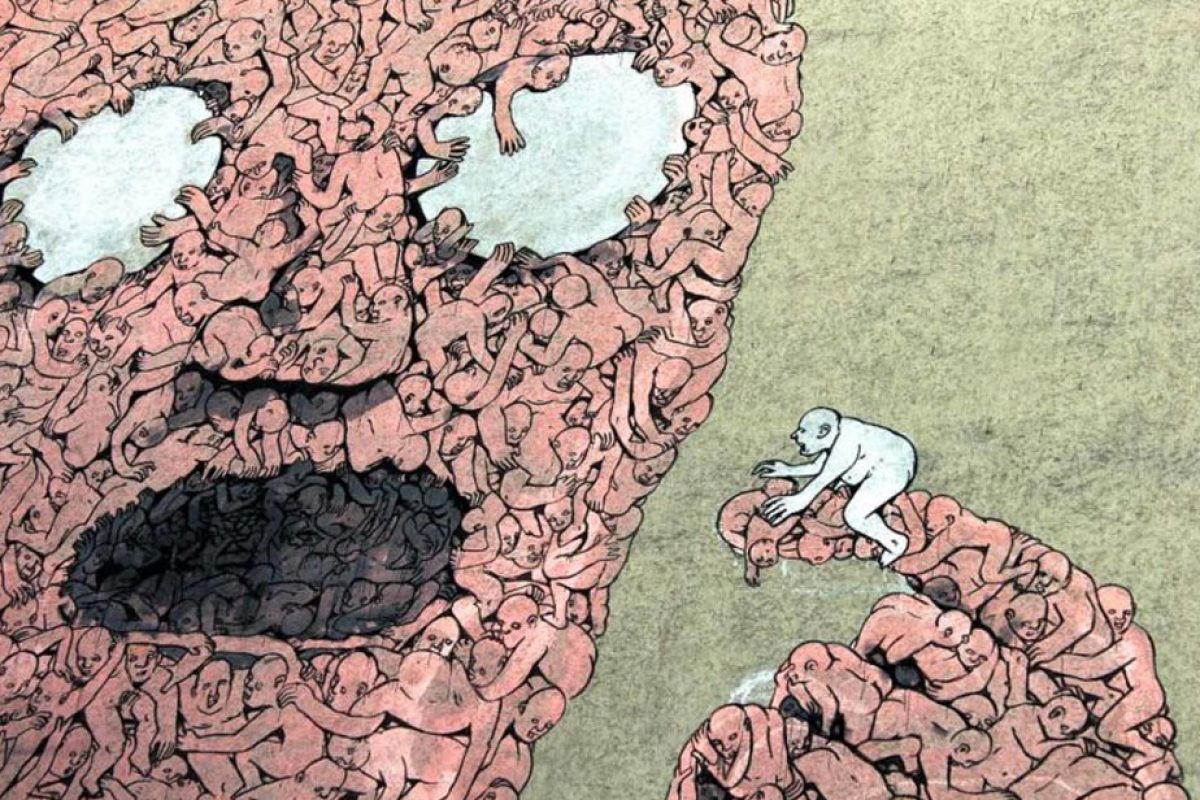What is to be done? Who is it to be done for? What are the aims that are to be served? What are the goals? What makes these goals so urgent? These are all questions that we just CAN’T afford to go into if we are to stay safely in the world of ‘busy, busy, busy’!
When we do go into these questions then we drop right out of the world of ‘busy, busy, busy’. We can no longer remain safely ‘busy, busy, busy’. The whole thing falls apart like a brown paper bag full of shopping when we get caught in a heavy downpour. It gives way. It comes to pieces all around us. It gets revealed as a sham – it gets shown up as a sham world. Sham activity in a sham world…
So what we do – in order to prevent this from happening – is to fixate on superficial answers to these dangerous questions. We fixate on superficial answers and we get very upset (or very angry) if anyone persists in questioning them. ‘Fixating’ doesn’t mean that we actually ever look at the answers or examine them in what might be called a ‘philosophical’ way – it simply means that we fixate on the label. We fixate on the envelope, we fixate on the packaging, etc. We fixate on the nominal meaning. We fixate on the assumed ‘fact’ that these answers are right, that they are legitimate, that they are what they claim to be. We fixate on the description of ‘what is going on’ so that, for us, the arbitrary description that we have fixated upon becomes the reality.
So we say that ‘X’ is to be done. And we say that it is to be done because of reason ‘Y’ or reason ‘Z’. We say that it is to be done for me, or for you, or for him, or for her. We say that it is to be done for the government, or for society, or for the organization, or for the company. We say it is to be done for the sake of some ideal. We have to ‘do the thing’. We have to ‘do the thing because of the thing’! But really it doesn’t matter what we say. None of these things are real. There are no ‘things’ – we just agree to pretend that there are these ‘things’, and then forget that we have pretended. It’s all arbitrary – we just have to come up with something. We just need a few hooks to hang the whole thing on. We need some kind of convenient justification for what we’re doing, so that we don’t have to question it. We need ‘fictional entities’. We need a ‘what’ and a ‘who’ and a ‘why’. We need ‘things’.
Really, none of the convenient answers (or things) that we come up with can hold up to scrutiny. They don’t hold water. They don’t stand up to philosophical examination. They’re all just pretexts for carrying on doing what we were doing before we had a reason for doing it. All of our ‘reasons’ are pretexts for doing what we already wanted to do before we had a reason. We wanted to be busy. The reason comes afterwards; the justification comes after the event. Our reasons are all arbitrary – they’re treated as absolutes but they’re not. There are no absolutes! Whatever we’re doing, we don’t have to do. There are no serious reasons for doing anything, really. There are no ‘have to’s’. There are no fixtures to hang stuff on. It’s all just flow…
If we do something it’s because we choose to do it, not because we have to. We act out of freedom not out of serious necessity, no matter what we may say to the contrary. As James Carse (1987) says,
It is an invariable principle of all play, finite and infinite, that whoever plays, plays freely. …
When we live in a reality that is made up of serious necessities (or ‘rules’) we do so because we have freely chosen to do so. We have agreed to see things this way – we have agreed to see the world in a way that is based on rules rather than freedom. In a way that is based on fixtures rather than flow. We’re not really busy because we have to be busy, which is how we like to see it; we’re busy because we choose to be busy and the game that we’re playing is that we didn’t choose it!
So this brings up the question, why do we choose to be busy, busy, busy, and also choose to believe that we DIDN’T choose for things to be this way?
Why do we choose to live in a world that is ruled by serious necessities, by inflexible rules? Why do we choose to be ‘all caught up’ like this, with no possibility of ever not being caught up, with no possibility of ever seeing that there could ever be anything else other than being ‘all caught up’? Why do we chose to eradicate freedom? Why do we choose to live in a world that is ‘serious not playful’, a world that has no ‘gaps’ or ‘breaks’ in it during which we could pause to consider the possibility that there could perhaps be another way?
The answer is not hard to see… We play the game of ‘busy, busy, busy’ not because of the reasons we give for being ‘busy, busy, busy’ – we play the game of ‘busy, busy, busy’ because we don’t want to see something. ‘Busy, busy, busy’ is the behaviour of fear! ‘Busy, busy, busy’ is the game of denial.
The real question is, therefore, “What is it that we don’t want to see?”
What is it that we don’t want to see and why don’t we want to see it?
Image – inspiringcity.com






